 W
WAce Combat: Assault Horizon is a spin-off installment of the Ace Combat arcade combat flight video game series. It was developed by Project Aces and published by Namco Bandai Games for the PlayStation 3 and Xbox 360 platforms in October 2011. The game was later released on Microsoft Windows in January 2013 through Steam and Games for Windows – Live, with the latter notably being the final retail release for the platform shortly before its discontinuation.
 W
WAI: The Somnium Files is an adventure video game developed and published by Spike Chunsoft, which released for Microsoft Windows, PlayStation 4, and Nintendo Switch in September 2019. It is set in Tokyo and follows detective Kaname Date, who investigates serial killings and enters suspects' memories to extract information to help solve them. The game was directed and written by Kotaro Uchikoshi, with character designs by Yūsuke Kozaki.
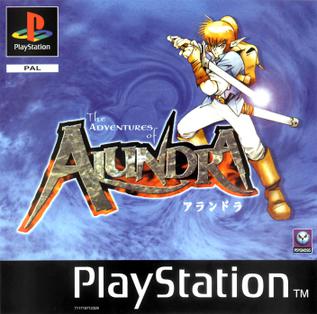 W
WAlundra , released in Europe as The Adventures of Alundra, is an action-adventure video game developed by Matrix Software for the PlayStation, originally released in 1997.
 W
WBloodborne is an action role-playing game developed by FromSoftware and published by Sony Computer Entertainment, which released for the PlayStation 4 in March 2015. Bloodborne follows the player's character, a Hunter, through the decrepit Gothic, Victorian era–inspired city of Yharnam, whose inhabitants are afflicted with a blood-borne disease. Attempting to find the source of the plague, the player's character unravels the city's mysteries while fighting beasts and cosmic beings.
 W
WBugs Bunny in Double Trouble is a Looney Tunes video game developed by Atod AB for the Sega Genesis and Game Gear, released in 1996. The game stars Bugs Bunny and features pre-rendered 3D graphics.
 W
WCommander Keen in Keen Dreams is a side-scrolling platform video game developed by id Software and published by Softdisk in 1991 for DOS. It is the fourth episode of the Commander Keen series. The game follows the titular Commander Keen, an eight-year-old child genius, in an adventure in his dreams as he journeys through a vegetable kingdom to defeat the evil potato king Boobus Tuber and free enslaved children from the Dream machine. The game features Keen running and jumping through various levels while opposed by various vegetable enemies; unlike the prior three episodes, Keen does not use a pogo stick to jump higher, and throws flower power pellets to temporarily turn enemies into flowers rather than shooting a raygun to kill them.
 W
WDark Seed II is a psychological horror point-and-click adventure game developed and published by Cyberdreams in 1995, and is the sequel to the 1992 game Dark Seed. It sees recurring protagonist Mike Dawson's continued adventures in the H.R. Giger artwork-based "Dark World." Designed and written by future James Bond novelist Raymond Benson, the game was released for Microsoft Windows 3.x, Macintosh, Sega Saturn, and Sony PlayStation. As was the case with Dark Seed, console versions of Dark Seed II were released only in Japan, though they were additionally fully dubbed in Japanese. Unlike the original game, the Saturn version of Dark Seed II does not support the shuttle mouse.
 W
WDrakengard 3, known in Japan as Drag-On Dragoon 3, is an action role-playing video game developed by Access Games and published by Square Enix exclusively for PlayStation 3. It is the third game in the Drakengard series and a prequel to the original game. The game, like the rest of the series, features a mixture of ground-based hack-and-slash combat and aerial battles. The story focuses on Zero, a woman who can manipulate magic through song. Partnering with a dragon named Mikhail, Zero set out to kill her five sisters, who rule the world's regions. As she travels, the player discovers the true reason behind Zero's rampage.
 W
WDreamkiller is a dark fantasy first-person shooter where the player takes on the role of Alice Drake, a psychologist with the ability to enter the minds of her patients to fight the monsters appearing in their dreams. The game is developed by Mindware Studios and published by Aspyr for Microsoft Windows.
 W
WDreams to Reality is a 1997 third-person action-adventure game developed and published by Cryo Interactive. It was ported to the PlayStation under the title Dreams.
 W
WDreamscape is a 2011 first-person adventure video game, with puzzle elements, developed and published by American studio Speedbump Studios. It was released worldwide on June 9, 2011 for iOS devices exclusively. The game does not follow traditional video game conventions, as it involves minimal interaction from the player and does not require choices to be made, and there are only basic puzzles for the player to complete. It instead places focus on its story, which is told through the perspective of a man called Wilson, who is caught in the limbo between life and death. Moments before his death, Wilson is transported to his own Dreamscape and is allowed to relive all his memories for one last time. While there he finally discovers the truth as to why his fiancee, Amelia, disappeared on the day of their wedding.
 W
WGiana Sisters DS, also known on other handheld platforms as Giana Sisters, is a platform game developed by Spellbound Interactive in cooperation with Bitfield GmbH for the Nintendo DS, iPad, iPhone, and Android. It was published by DTP Entertainment in Europe and Destineer in North America. It is a spiritual sequel to the 1987 Commodore 64 release The Great Giana Sisters. A version for Microsoft Windows, entitled Giana Sisters 2D, was also released.
 W
WGiana Sisters: Twisted Dreams is a platform game developed by Black Forest Games for Microsoft Windows. It is the successor to the 1987 Commodore 64 title The Great Giana Sisters and sequel to the 2009 re-imagining Giana Sisters DS. The game was funded through crowdfunding website Kickstarter, reaching its goal of $150,000.
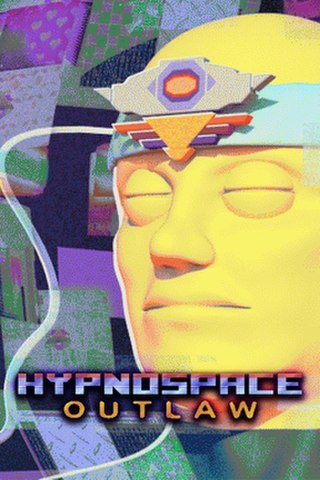 W
WHypnospace Outlaw is a simulation video game developed by Tendershoot and published by No More Robots. Set in an alternate-history 1999, the game takes place inside a parody of the early Internet and its culture that users visit in their sleep called Hypnospace. The player assumes the role of an "Enforcer" for the company Merchantsoft—creator of Hypnospace—and seeks to police illegal content, copyright violations, viruses, and cyberbullying by users on the service. In the process, the player engages in detective work and puzzle-solving. It was released for Microsoft Windows, macOS, and Linux in March 2019, and for Nintendo Switch, PlayStation 4, and Xbox One in August 2020.
 W
WKiller Is Dead is a 2013 hack and slash video game developed by Grasshopper Manufacture. It is published by Kadokawa Games in Japan, Marvelous USA in North America, and Deep Silver in Europe.
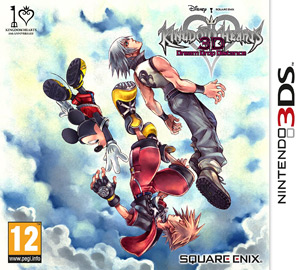 W
WKingdom Hearts 3D: Dream Drop Distance is an action role-playing video game developed and published by Square Enix for the Nintendo 3DS, revealed at E3 2010. The game is the seventh installment in the Kingdom Hearts series and was released in Japan on March 29, 2012. It was released outside Japan on July 20, 2012 in Europe, July 26, 2012 in Australasia and July 31, 2012 in North America.
 W
WKlonoa: Door to Phantomile is a platform game developed and published by Namco for the PlayStation in 1997. The story follows Klonoa and his friend Huepow in their efforts to save the dream world of Phantomile from an evil spirit intent on turning it into a world of nightmares. The player controls Klonoa through a 2.5D perspective; the stages are rendered in three dimensions but the player moves along a 2D path. Klonoa can grab enemies and throw them as projectiles, or use them as a jump boost to navigate through the stages.
 W
WLand of Illusion Starring Mickey Mouse, released in Japan as Mickey Mouse no Mahō no Crystal (ミッキーマウスの魔法のクリスタル), and in Brazil as Land of Illusion Estrelando Mickey Mouse, is a platform game developed and published by Sega for the Master System and Game Gear.
 W
WThe Legend of Spyro: The Eternal Night is a video game in the Spyro the Dragon series. It is the second game in The Legend of Spyro trilogy, released for the Game Boy Advance, Nintendo DS, PlayStation 2 and Wii.
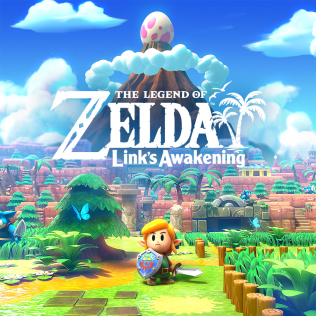 W
WThe Legend of Zelda: Link's Awakening is an action-adventure game developed by Grezzo and published by Nintendo for the Nintendo Switch. It was released on September 20, 2019. Link's Awakening is a remake of the 1993 game for the Game Boy. It retains the original's top-down perspective and gameplay, along with elements from the 1998 rerelease Link's Awakening DX.
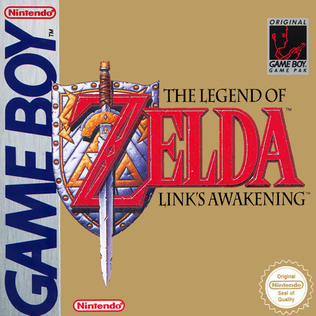 W
WThe Legend of Zelda: Link's Awakening is a 1993 action-adventure game developed and published by Nintendo for the Game Boy. It is the fourth installment in the Legend of Zelda series and the first for a handheld game console. Link's Awakening is one of the few Zelda games not to take place in the land of Hyrule, and does not feature Princess Zelda or the Triforce relic. Instead, protagonist Link begins the game stranded on Koholint Island, a place guarded by a whale-like deity called the Wind Fish. Assuming the role of Link, the player fights monsters and solves puzzles while searching for eight musical instruments that will awaken the sleeping Wind Fish and allow him to escape from the island.
 W
WLife Is Strange is an episodic graphic adventure video game developed by Dontnod Entertainment and published by Square Enix for Microsoft Windows, PlayStation 3, PlayStation 4, Xbox 360, Xbox One, iOS and Android. The first installment of the Life is Strange franchise, the game was released in five episodes periodically throughout 2015.
 W
WLittle Nemo: The Dream Master is a platform game released on the NES in 1990 by Capcom. It is based on the Japanese animated film, Little Nemo: Adventures in Slumberland from Tokyo Movie Shinsha, which itself is based on the comic strip Little Nemo in Slumberland by Winsor McCay. The game's music was composed by Junko Tamiya, credited in the game as "Gonzou".
 W
WLSD: Dream Emulator is an exploration game developed and published by Asmik Ace Entertainment for the PlayStation. In LSD, the player explores surreal environments without any objective. The player can only move and touch objects that will warp them to another setting. The game was conceived by Japanese artist Osamu Sato, who rejected the idea of games, and wanted to use the PlayStation as a medium for creating contemporary art. The game's concept is based on a dream diary kept by an Asmik Ace employee for over a decade.
 W
WLucidity is a side-scrolling puzzle-platform game developed and published by LucasArts for the Microsoft Windows and Xbox Live Arcade.
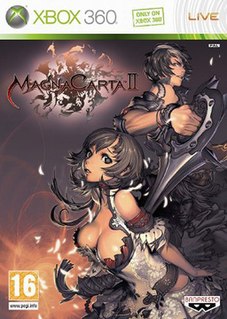 W
WMagnaCarta 2 is a video game developed by South Korean developer Softmax and published by Bandai Namco Games exclusively for Xbox 360. It is a follow-up to the role-playing video games Magna Carta: The Phantom of Avalanche released on Windows and Magna Carta: Crimson Stigmata released on the PlayStation 2. It was released in Japan on August 6, 2009 and in North America on October 13, 2009. This marks the series' first entry onto a seventh generation console. The game was officially unveiled in the April 2009 edition of Famitsu magazine.
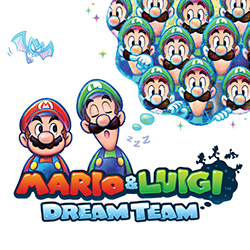 W
WMario & Luigi: Dream Team, known in Europe and Australia as Mario & Luigi: Dream Team Bros., is a 2013 role-playing video game developed by AlphaDream for the Nintendo 3DS. Revealed on Nintendo Direct on February 14, 2013, it is the fourth entry in the Mario & Luigi series of Mario role-playing games. In the United States, a download code for the game was included with a silver Mario & Luigi-themed Nintendo 3DS XL.
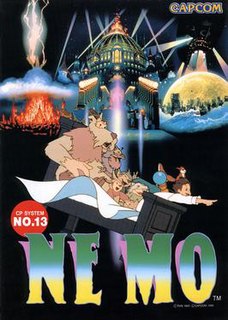 W
WNemo , is a side-scrolling fantasy arcade game released by Capcom in 1990. The game is based on the anime film Little Nemo: Adventures in Slumberland.
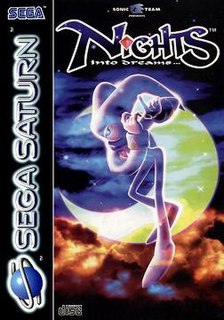 W
WNights into Dreams is a 1996 action game developed by Sonic Team and published by Sega for the Sega Saturn. The story follows teenagers Elliot Edwards and Claris Sinclair, who enter Nightopia, a dream world where all dreams take place. With the help of Nights, an exiled "Nightmaren", they begin a journey to stop the evil ruler Wizeman from destroying Nightopia and consequently the real world. Players control Nights flying through Elliot and Claris's dreams to gather enough energy to defeat Wizeman and save Nightopia. The game is presented in 3D and imposes time limits on every level, in which the player must accumulate points to proceed.
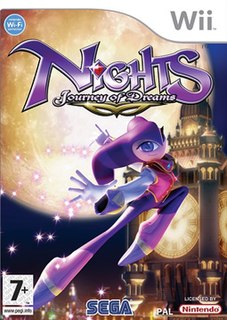 W
WNights: Journey of Dreams is an action video game developed by Sonic Team and published by Sega for the Wii. The sequel to the 1996 Sega Saturn title Nights into Dreams, it was released in Japan and North America in December 2007, and in Australia and Europe the following month. The story follows two children, William Taylor and Helen Cartwright, who enter a dream world called Nightopia. When their nightmares come to life, they enlist the help of NiGHTS, an exiled "Nightmaren", as they journey through Nightopia to stop the evil ruler Wizeman from escaping into the real world.
 W
WPeggle Nights is a Windows, Mac OS X and Microsoft Xbox Live Arcade downloadable game from PopCap Games. Upon its release, PopCap marketed the game as a "follow-up" to Peggle, although an actual sequel to the 2007 PC Game was released in 2013. The gameplay between Peggle and Peggle Nights has remained largely unchanged, with each stage featuring a colorful 2D background filled with different colored "pegs". The objective in each level is to clear all of the orange pegs by hitting them with a ball shot from the top of the screen. New to this version are 60 new levels, 60 additional challenges, the introduction of the new Peggle Master Marina the Electric Squid, and the addition of an "Aced" score for each level.
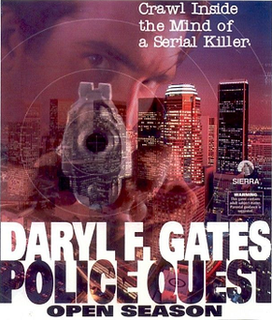 W
WPolice Quest: Open Season is the fourth installment of Sierra On-Line's popular Police Quest series. Released in November 1993, it was created by retired Police Chief Daryl F. Gates, who was the Chief of the Los Angeles Police Department (LAPD) from 1978 to 1992. He replaced ex-California Highway Patrol officer Jim Walls as the designer of the franchise.
 W
WRayman is a side-scrolling platform video game developed and published by Ubi Soft. As the first installment in the Rayman series, the game follows the adventures of Rayman, a hero who must save his colourful world from the evil Mr. Dark. Originally designed for the Atari Jaguar in 1995, a PlayStation version was developed and released in time for the North American launch of the console on 9 September 1995; and further ports were created for Sega Saturn in 1995 and MS-DOS computers in 1996. The game has appeared in various other formats, including versions for the Game Boy Advance, PlayStation Network, DSiWare, and iOS and Android devices.
 W
WRayman 2: The Great Escape is a platform video game developed by Ubi Pictures and published by Ubi Soft for the Nintendo 64, Microsoft Windows, Sega Dreamcast and Sony PlayStation. An enhanced remake titled Rayman Revolution was developed by Ubi Soft Annecy for the PlayStation 2.
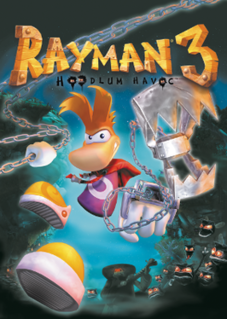 W
WRayman 3: Hoodlum Havoc is a platform game, the third major installment in the Rayman series. It tells the story of how Rayman stops André, an evil black lum, from taking over the world with his army of sack-like "Hoodlum" soldiers. Unlike the game's predecessor, Rayman 3 took a more light-hearted turn, it has sarcastic self-referential undertones and pokes fun at the platforming video game genre. It was released for the GameCube, PlayStation 2, Xbox and Microsoft Windows by Ubi Soft in 2003 and OS X by Feral Interactive in 2004. A remastered HD version of the game was released for PlayStation Network and Xbox Live Arcade in 2012. 2D versions were developed for the Game Boy Advance, N-Gage and mobile phones. A follow up game, Rayman: Hoodlums' Revenge, was released for the Game Boy Advance in 2005. This would be the last main series Rayman game to be released until Rayman Origins in 2011. The game is also the latest in the series to be in 3D.
 W
WRayman Legends is a platform video game developed by Ubisoft Montpellier and published by Ubisoft. It is the fifth main title in the Rayman series and the direct sequel to the 2011 game Rayman Origins. The game was released for Microsoft Windows, PlayStation 3, Xbox 360, Wii U, and PlayStation Vita platforms in August and September 2013. PlayStation 4 and Xbox One versions were released in February 2014. A Nintendo Switch port, titled Rayman Legends Definitive Edition was released in North America, Europe and Australia on September 12, 2017.
 W
WRayman Origins is a platform video game developed by Ubisoft Montpellier and published by Ubisoft for PlayStation 3, Xbox 360, Wii, PlayStation Vita, Nintendo 3DS, and Microsoft Windows. It is the fourth main installment in the Rayman series, and the first main installment since 2003's Rayman 3: Hoodlum Havoc. The game was released on 15 November 2011 in North America, 24 November 2011 in Australia, and 25 November 2011 in Europe for PlayStation 3, Xbox 360 and Wii. It was released later for PlayStation Vita, Nintendo 3DS, and Microsoft Windows. The OS X version of the game was released on 12 December 2013 by Feral Interactive. The story follows Rayman, his friend Globox and two teensies as they fight Darktoons and other evil creatures that have infected the Glade of Dreams.
 W
WSheep, Dog 'n' Wolf is a puzzle-platformer stealth video game developed and published by Infogrames for Microsoft Windows and PlayStation.
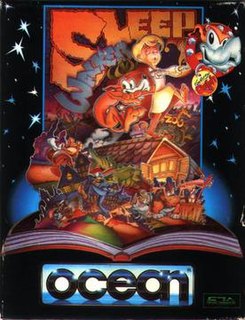 W
WSleepwalker is a platform game developed by CTA Developments and published by Ocean Software for the Amiga, Amiga CD32, Commodore 64 and Atari ST in 1993. It was later ported to MS-DOS.
 W
WSonic Shuffle is a Sonic the Hedgehog-themed party game developed and published by Sega for the Dreamcast in 2000. The game plays like a board game much in the same vein as Nintendo's Mario Party series, with up to four players moving their characters across a game board filled with a variety of spaces which can trigger different events. Some spaces will launch minigames that pit the players against each other in short competitive events.
 W
WSoul Sacrifice is an action role-playing video game developed by Marvelous AQL, with assistance from SCE Japan Studio, and published by Sony Computer Entertainment for PlayStation Vita. It was released worldwide in 2013.
 W
WSuper Mario Bros. 2 is a platform video game developed and published by Nintendo for the Nintendo Entertainment System. The game was first released in North America in October 1988, and in the PAL region the following year. It has been remade or re-released for several video game consoles.
 W
WTak 2: The Staff of Dreams is a video game developed by Avalanche Software and published THQ for GameCube, Game Boy Advance, PlayStation 2 and Xbox. It is the sequel to Tak and the Power of Juju and it was released in 2004. The PS2 version was ported to PlayStation Network as a "PS2 Classic" on November 29, 2011, but it was later taken off the store due to THQ's bankruptcy in 2013.